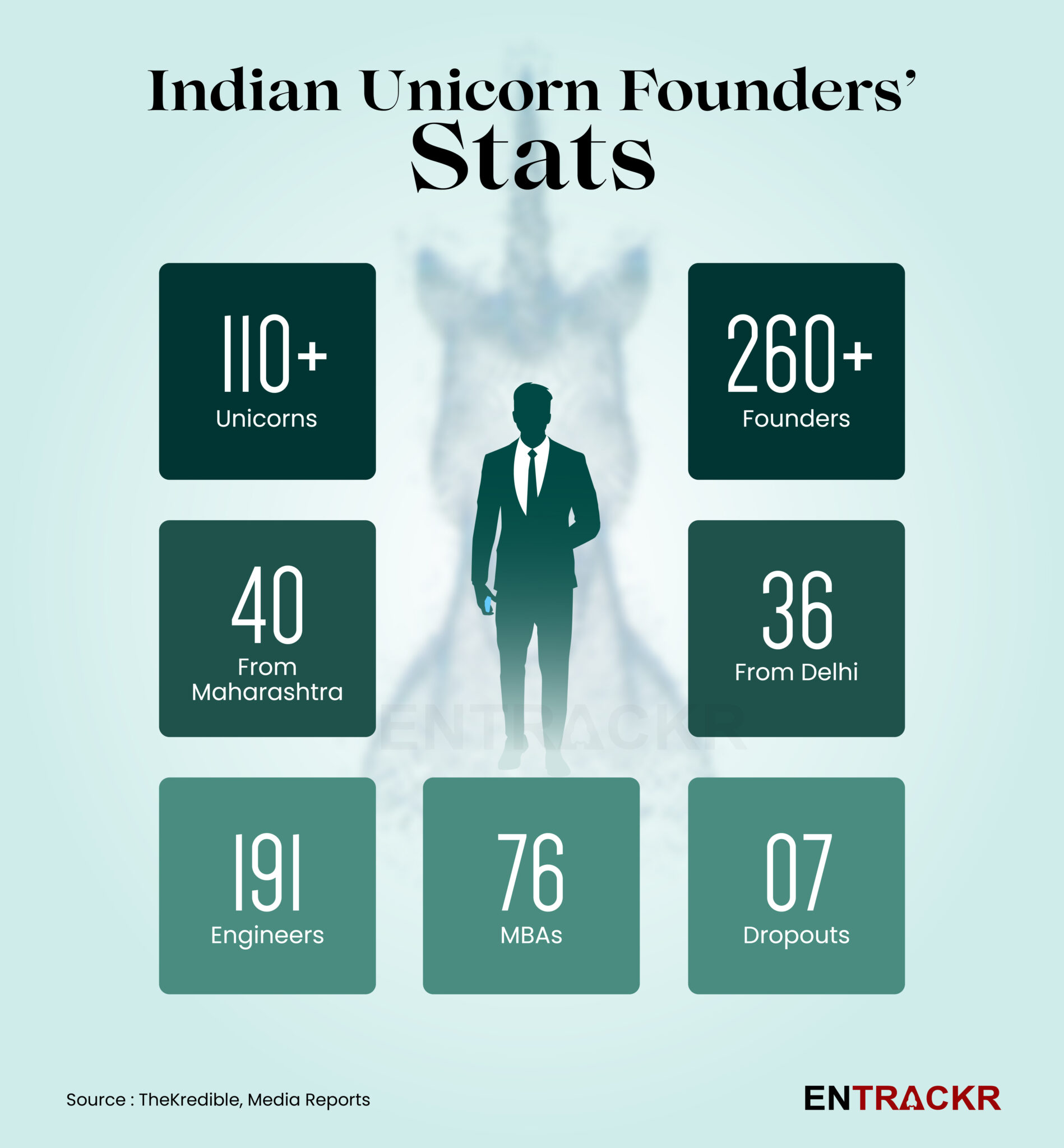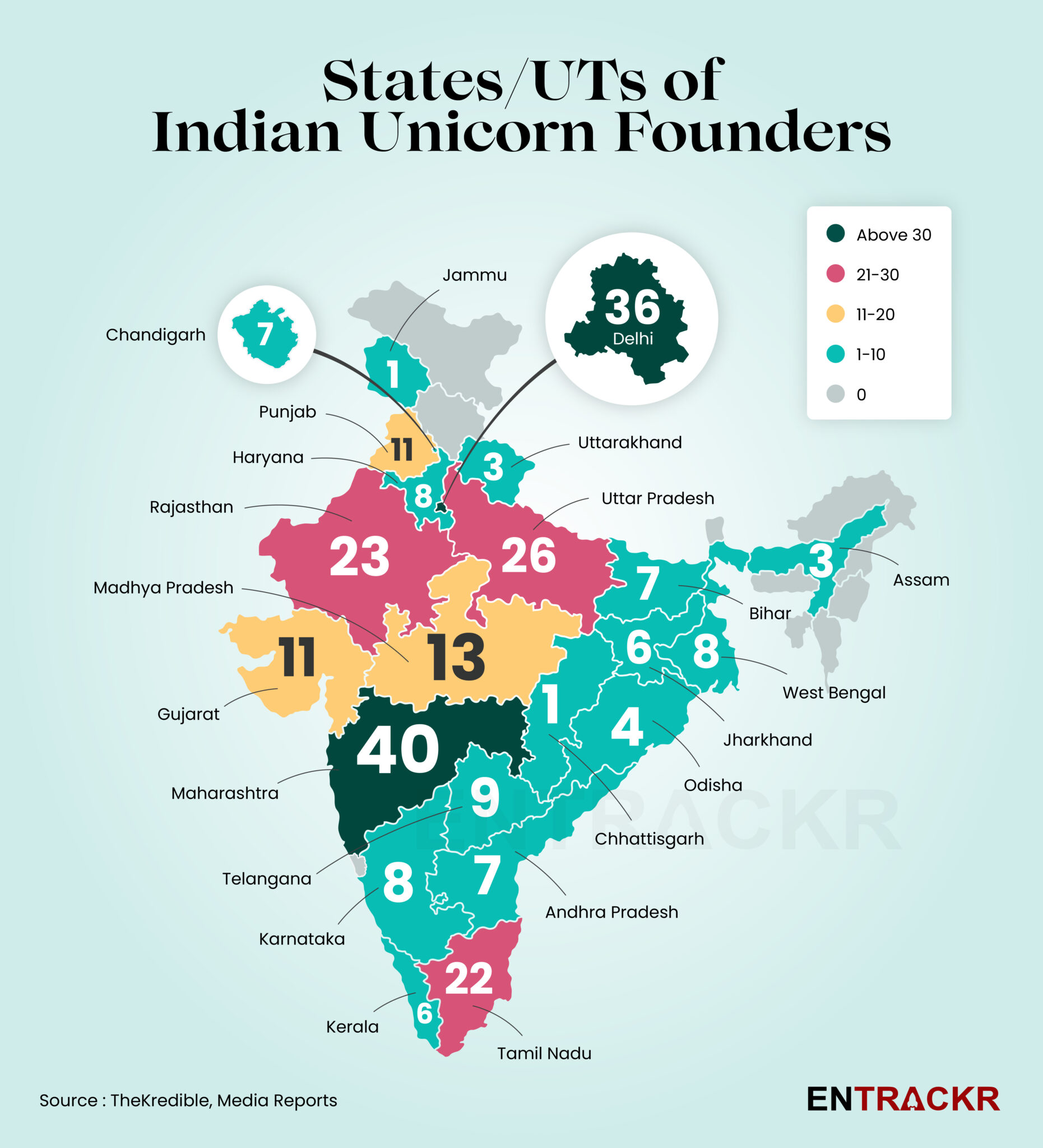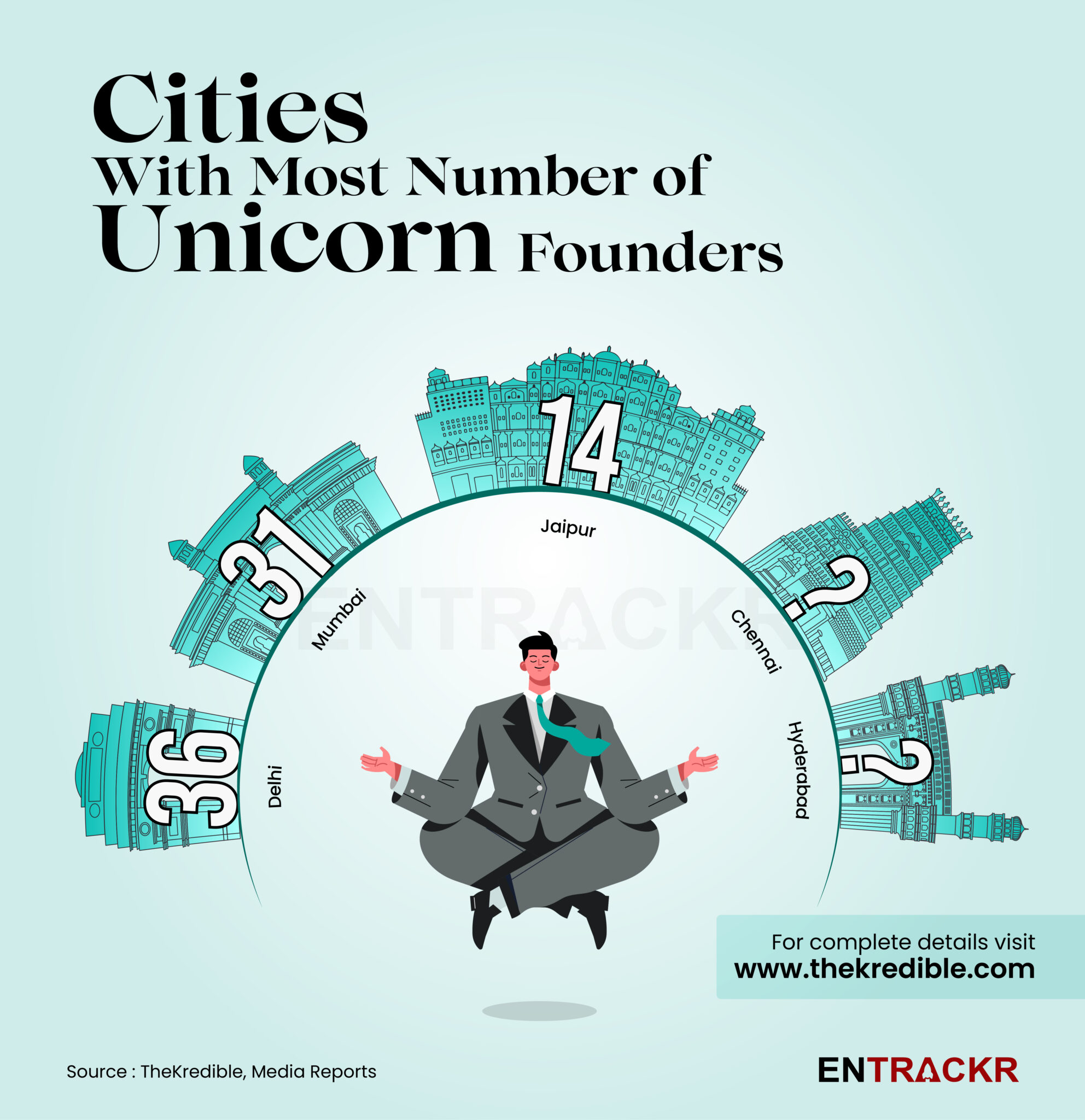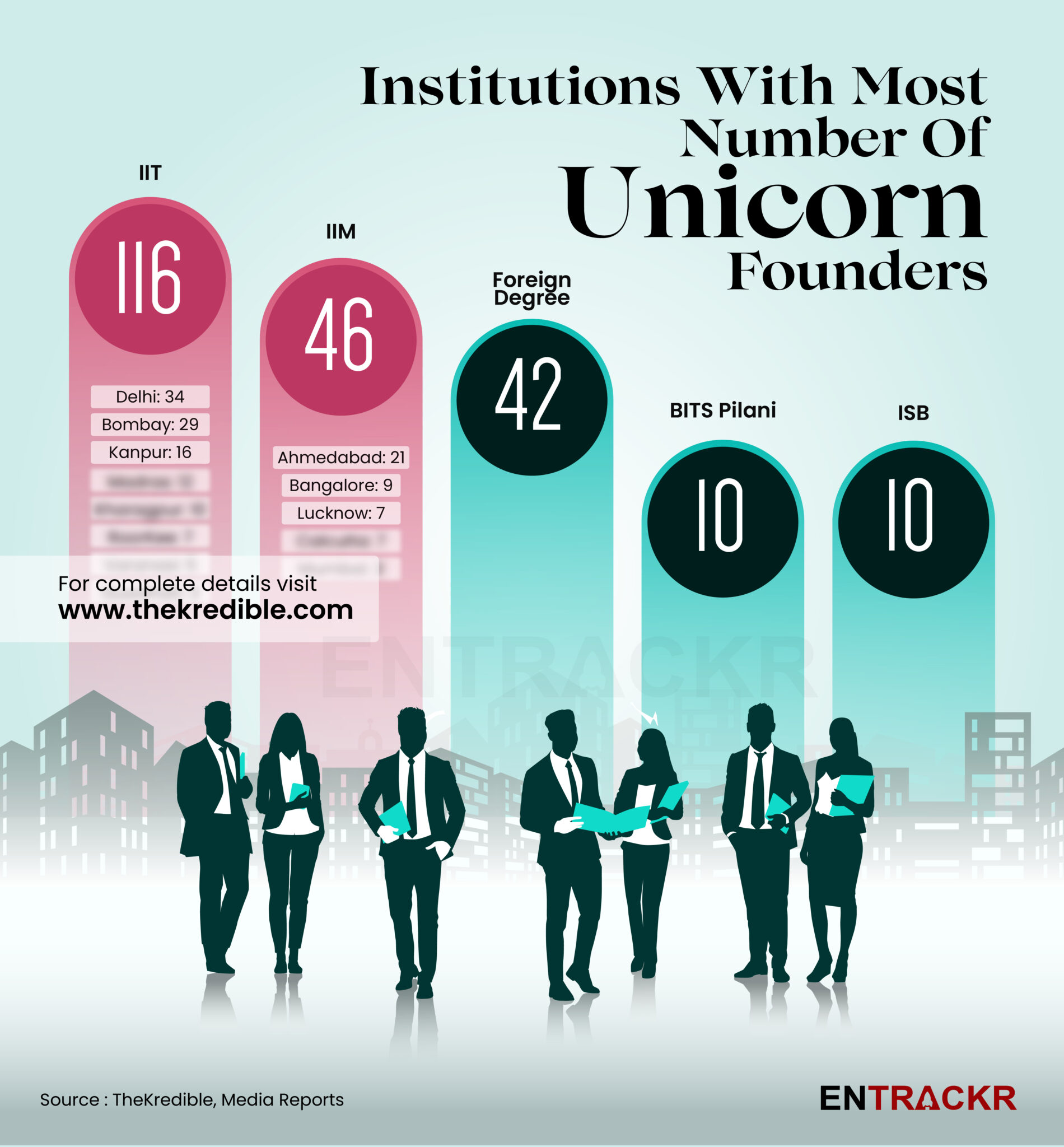India ranks third in the world in terms of the number of startup unicorns. Since the first unicorn in 2011, India has produced more than 110 unicorns. But more than 60% of these unicorns attained their status in the past three years — reflecting the recent acceleration in the sector.
India’s startup story is indeed an India story in letter and spirit as these unicorns have roots in all corners of the country. And the founders mirror the diversity. Importantly, unlike the ‘export focused’ firms of a previous era, most chose to build for India after graduating from prestigious educational institutions such as the IITs and IIMs — reversing the trend of the so-called brain drain.

In this report, Entrackr takes a closer look at the origins of unicorn founders, including their home states, educational backgrounds, and more. For this report, we have prioritised birthplace followed by hometown. The list also counts former unicorns and unicorn founders who were in the founding team but now have left the company.
Here are some key takeaways.
States/UTs of Indian unicorn founders
As per data compiled by TheKredible, India is home to more than 110 unicorns and more than 260 founders have helped these companies achieve the milestone.
Maharashtra produced the most number of unicorn founders (40) who were either born in the state or have their hometown there.
Delhi, the national capital, comes second with 36 founders.
Uttar Pradesh, Rajasthan and Tamil Nadu round off the list of top 5 states with the most number of unicorn founders. The top 5 states cover more than 55% of the population in India.

Madhya Pradesh, Punjab, Gujarat, and Telangana were next on the list with 13, 11, 11, and 9 unicorn founders respectively while Haryana, West Bengal and Karnataka shared the same number of unicorn founders for the 10th spot. Chandigarh, a union territory and the capital city of Haryana and Punjab, produced as many as 7 unicorn founders, harking back to the spirit of entrepreneurship that Punjab was known for till the lost decades post-1990.
As per our database, only 8 founders were born or have their hometown in Karnataka. Notably, around 40% of Indian unicorns are headquartered in Bengaluru. Proving just how much it matters to create the right enabling environment for talented outsiders, if dynamism is what you seek in a region.
States such as Bihar and Jharkhand are on par with Karnataka, Andhra Pradesh, West Bengal and Kerala in terms of producing unicorn founders.
So far, there are no unicorn founders from Kashmir, or the smaller states including Himachal Pradesh, Sikkim, Goa, and northeast states like Manipur, Arunachal Pradesh, Mizoram, Meghalaya and Tripura.
Check TheKredible for the full database and more details.
City of Indian unicorn founders
Delhi is the top city in terms of producing unicorn founders with 36 founders either born or tracing their hometown in the national capital. The data corroborates the fact that Delhi-NCR is one of the top hubs for startups. Further, Mumbai has produced 31 unicorn founders followed by Jaipur, Chennai and Hyderabad, per TheKredible data.

Chandigarh, Pune, Kolkata, Bengaluru, Ahmedabad and Lucknow are in the top 10 list. Coimbatore, Indore, Jabalpur, Kanpur and Patna produced 4 unicorn founders each. Please visit TheKredible for more details.
Unicorn founders from small towns
TheKredible has also compiled data on unicorn founders from smaller towns.
For context, Udaan co-founder Sujeet Kumar was born in Bhabua (Kaimur), Bihar whereas its other co-founder Amod Malviya is from Robertsganj, Uttar Pradesh.
The list also includes Spinny founder Niraj Singh, born in Jharkhand’s Daltonganj, Oyo founder Ritesh Aggarwal (Bissam Cuttack, Odisha), Meesho co-founder Sanjeev Barnwal (Hazaribagh, Jharkhand), Vedantu co-founders Vamsi Krishna and Anand Prakash, who are from Arakkonam in Tamil Nadu and Sitamarhi in Bihar, respectively.
Institutions with most number of unicorn founders
When it comes to institutions, out of 262 founders of unicorns, 116 (44%) come from IIT.
IIT-Delhi leads the chart with 34 founders followed by IIT-Bombay and IIT-Kanpur with 29 and 16 founders respectively.
In terms of a master’s degree, the IIM brand is on top with 46 founders (17.5%) comprising 21 from IIM Ahmedabad, 9 from IIM Bangalore, and 7 from IIM Lucknow. Check TheKredible for more details.
Besides IIT and IIM, 10 unicorn founders have completed their degree from BITS Pilani, 10 have their degree from the Indian School of Business while 42 founders have pursued their degrees from foreign institutions/universities such as New York University, London School of Business, Harvard Business School, Stanford University, and Insead, among others.
The landscape may change
India’s unicorn landscape may further change as a new generation of startups are inching closer to the unicorn status. Conveniently called soonicorns, as many as half a dozen have already crossed the $800 million valuation threshold.
As per our analysis, around 20% of Indian unicorns are overseas headquartered, mainly linked to tax status or ease of doing business, besides closer access to key markets in some cases. Unicorns like Fractal, Hasura, HighRadius, MuSigma, Browserstack, Mindtickle, ChargeBee, and Postman have headquarters outside India. However, a bunch of startups have started moving their operations to India. For context, PhonePe moved its domicile to India while Groww and Razorpay are planning to move their parent firms to India.
In terms of gender ratio, the representation of women in the unicorn ecosystem in India still remains low. Out of 262 unicorn founders, the number of women founders stood at only 17 or 6.48%.
Conclusion
While there is much that is predictable in this list, if there is one thing that should change, it is the dominance of the IITs and IIM brands. Without grudging their success, for a country of India’s vast size and student population, such a dominance of a select few institutes is quite simply a severe indictment of the vast number of institutes teaching millions of students without achieving results even close to the IITs and IIMs. This has to change for the future of this country, forget the startup ecosystem.
There are many other aspects that need improvement, where we don’t even need a deep dive at this stage to predict outcomes. Be it gender diversity, the dominance of a select few sectors, or a deeper look at the promising startups failed by a poor policy and business environment. In a continent sized country like India, it has never been more critical to ensure a wider spread of these success stories. At the state level, much needs to be done by some of our biggest states to ensure local talent stays and thrives there too. While building the kind of ecosystem that a Bengaluru or NCR offers might seem daunting, we believe it is never too late to catch up in many promising regions. The sooner it is attempted in earnest, the more likely we are to continue minting not just Unicorns, but genuine changemakers for the country.
















